Drakengard 2 Original Soundtrack
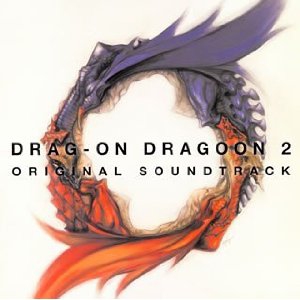 |
Album Title: Drakengard 2 Original Soundtrack (Drag-on Dragoon 2 Original Soundtrack) |
| Record Label: Sony Music Associated Records |
|
| Catalog No.: AICL-1628 |
|
| Release Date: July 20, 2005 |
|
| Purchase: Buy at CDJapan |
Overview
The Drakengard score proved one of the most divisive soundtracks in history. While many soundtrack collectors appreciated the unique dissonant sound that Nobuyoshi Sano and Takayuki Aihara built for the game, it was too weird and intense for many that played the game. For the sequel, developer cavia significantly changed their musical approach. While the music continued to be intense and dramatic, the soundtrack focused more on neo-Romantic pieces with more conventional forms, melodies, and harmonies. The duo Aoi Yoshiki took over the lead role here, writing all the in-game music. Takayuki Aihara and Masashi Yano additionally wrote the game’s thirty cinematic themes, none of which ever made it on to an album. The soundtrack release instead features the in-game music, as well as the spectacular ballad performed by Mika Nakashima.
Body
“Symphonic Poem ‘Forbidden Prelude'” is an impressive album opener full of textural contrasts. Much of the track sounds outwardly bombastic with its furious orchestral passages and bold performance from the Tokyo Philharmonic Chorus. However, it also manages to win the hearts of listeners — and stand out from the typical orchestral epic — with its rich chorale and resounding string passages. Boasting polished orchestration, compelling performances, and thoughtful in-game integration, this track is superlative in every way. Intense yet beautiful, “Fate” proves the most outwardly emotional addition to the soundtrack. Written in the style of a piano concertino, much of the track features gushing, schmaltzy piano passages reminiscent of Rachmaninoff. As the textures gradually thicken with the subtle layering of various orchestral instruments, the track blooms into a sweeping string passage. It’s a pity that most of the instruments here are sampled, but the implementation was excellent for 2005 and still acceptable a decade later.
Maintaining the intensity, “Plains of Pity” and “Reminiscence is Madness” share the same leitmotif. While the brass melody itself is rather consonant, these tracks sound highly demented thanks to their unrelenting chromatic chord progressions, jagged vocal lines, and heavy bass and percussion lines. The aptly-named “Reminiscence is Madness” is the darker one of the two, since the melody sounds out-of-place due to the way the harmonies have been implemented. Due to their heavy dissonance and repetitive loops, these tracks have striking similarities to the compositions on Drakengard, though are significantly more accessible overall. While no other track shares quite the same feel, the early addition “Old Tombstone” really adds some adrenaline to the soundtrack with its propulsive phrases, unusual instrumentation, and ever-thickening textures. The boss theme “Formidable Enemy” achieves similar effects, contrasting orchestral tutti with sections featuring intricate counterpoint.
“Valley of Darkness” and “Black Requiem” are also certain to inspire strong emotions. Both open with an prepared piano motif before moving into an elegaic string-led rendition of the introductory theme. “Vein of Grief” sounds all the more disturbing due to the flutter-tonguing flutes, heavy bass line, and haunting countermelodies, but has hidden beauty due to its gorgeous vocal passages, rich brass melodies, and colourful chord progressions. Like “Sadness” that follows, it is agonising to listen to, but remains somehow compelling due to the rich neo-Romantic orchestration and strong melodies. But perhaps the pinnacle of the soundtrack comes with the two arrangements of Nobuyoshi Sano’s vocal theme “Road B Staff Roll ‘Exhausted'” from the Drakengard soundtrack. Each is completely different, with “On the Holy Land” serving as a calming piano/flute/harp trio, and “The Broken Past” shifting back to dark and aggressive territory. Both tracks present a once-abstract melody into fully-developed opuses.
The latter half of the album comprises mostly of propulsive tracks, which is expected for a game that features chaotic war-torn battlefields. These tracks certainly present tonnes of energy and intensity, whether the persistent brass works of “Abysmal Earth”, the well-layered crisis motifs of “Decision’s End”, or the fast-paced discordant progressions of “Breakthrough”. But what separates these tracks from the average battle theme is their interludes. The distorted vocals bring a delicious twist to “Abysmal Earth”. Meanwhile “Twilight Hill” contrasts from the norm with its sorrowful string melodies and percussive piano motifs. In a score filled with dark tracks, “Breakthrough” also gives some light-hearted moments of the score with a playful glockenspiel solo. Shortly before the album’s conclusion, “Exploration” serves as a retrospective interlude with its boundless new age stylings and “Unrest” shifts from the melodic focus of the rest of the soundtrack in favour of brooding ‘noise music’. Neither are momentous highlights, but they serve their purpose and bring some diversity to the score.
“Final Battle” is no letdown after all the build-up that has occurred before it, and it is easily the most aggressive track on the album. The ominous choral introduction gives the track a surreal edge and acts as a good transition from “Unrest,” while the rest of the track is a mixture of full-blown anthemic passages and some tension-building interludes. Referencing back to “Fate”, the last minute of this track features an inspired piano solo, which serves to give this battle theme much more personality. The album ends with “Hitori (Single Version),” a vocal ballad sung by Mika Nakashima. Though the track is much less experimental compared to “Road B Staff Roll ‘Exhausted'” from Drag-on Dragoon, but is significantly more polished overall: boasting a heartrending and memorable melody, lavish development and harmonisation, and a standout performance from vocalist Mika Nakashima. While instrumentals take a mostly subordinate role, a gorgeous string section enters during the last two minutes and the eventual climax of the piece is nothing short of extraordinary. It’s a strong rival to every single pop ballad released from Square Enix, proving rich yet accessible.
Summary
Despite being relative newcomers to the field, Aoi Yoshiki clearly put their heart and soul into the score, creating one of the most stunning soundtracks ever to come out of a Square Enix game. They capture the war-torn visuals, dark storyline, and soaring gameplay with their intense music. However, they also offer a much more accessible experience than the Drakengard soundtrack by channelling neo-Romantic influences and offering numerous spell-binding melodies, harmonies, and interludes. The score won’t be for all — some pieces will be too dissonant for some, others too schmaltzy for others — but the overall quality of the composition, implementation, and integration of the score is highly impressive. The action themes and emotional themes are all consistently excellent, though very different, while the choral opener and ballad closer are the icing on the cake. However, keep in mind that this soundtrack focuses on the in-game music and the excellent music for most of the cinematic cues of the game still haven’t been released.
Do you agree with the review and score? Let us know in the comments below!
4.5
Posted on July 20, 2005 by Chris Greening. Last modified on September 20, 2014.

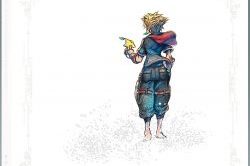
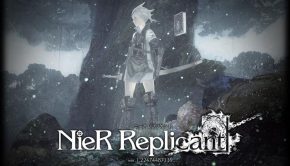
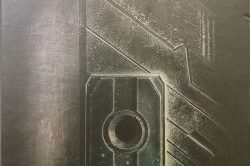
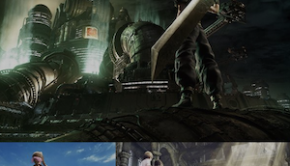










I purchased this soundtrack based on this review, and I was absolutely not disappointed. Stunning tracks all around. It is truly a shame however that some of the best cues in the game are still not released. I’m still holding out for those endgame versions of Tsukiru/Growing Wings.
Really cool that I influenced you to buy the album! We should petition Square Enix to re-release the soundtrack, complete with the cinematic cues!